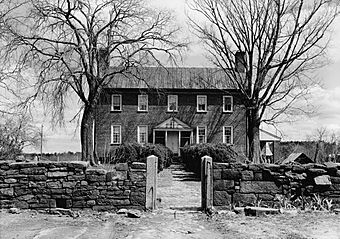Green Hill (Long Island, Virginia) facts for kids
|
Green Hill
|
|

Green Hill, HABS Photo
|
|
| Location | SW of Long Island near jct. of Rtes. 633 and 728, near Long Island, Virginia |
|---|---|
| Area | 0 acres (0 ha) |
| Built | c. 1800 |
| NRHP reference No. | 69000226 |
Quick facts for kids Significant dates |
|
| Added to NRHP | November 12, 1969 |
Green Hill is a special historic place located near Long Island, Virginia. It includes a large main house and many other old buildings. This site is known as a plantation house and a national historic district. It means the whole area is important for its history.
Contents
Discovering Green Hill's History
Green Hill was officially added to the National Register of Historic Places in 1969. This is a list of places in the United States that are important to history. Being on this list helps protect them for future generations.
What is Green Hill?
The main house at Green Hill is a two-story building. It is made of brick and has a sloped roof. It also has two chimneys inside. A smaller part of the house was built around the year 1800. The inside of the house has beautiful wooden details.
Exploring the Buildings at Green Hill
Besides the main house, Green Hill has many other interesting old buildings. These buildings help us understand what life was like long ago.
Here are some of the buildings you can find there:
- A wooden outbuilding with a porch.
- A brick duck house.
- An ice house, which was used to store ice before refrigerators existed.
- A kitchen building.
- A stone laundry building.
- Quarters where people who worked on the plantation lived.
- Another wooden kitchen with a stone chimney.
- A mounting block, used to help people get onto horses.
- Two large log barns.
- The remains of a big stone stable.
- A large barn for drying tobacco.
All these buildings together tell the story of Green Hill. They show us how people lived and worked on a plantation in the past.
Green Hill's Place in History
Green Hill is a private property today. It is recognized as a significant historical site in Virginia. Its listing on the National Register of Historic Places means it has special historical value. It helps us learn about the architecture and daily life from over 200 years ago.
 | Mary Eliza Mahoney |
 | Susie King Taylor |
 | Ida Gray |
 | Eliza Ann Grier |



